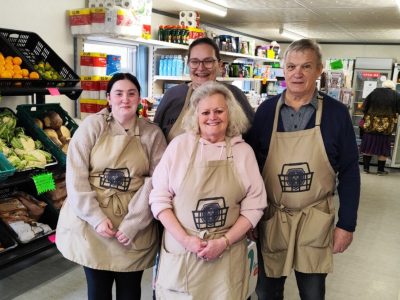A pioneering new report has revealed that Nourishing Norfolk is leading the way, providing a blueprint for other areas seeking to tackle food poverty and build community.
A new independent evaluation by the University of East Anglia has confirmed that Norfolk Community Foundation’s Nourishing Norfolk programme is doing far more than tackling food insecurity. It is helping people grow in confidence, bringing communities closer together, and changing the way local support works for the better.
What began as a single pilot in 2020 has grown into a network of 26 affordable food hubs across the county, reaching towns, rural communities and coastal communities that are often left behind. The UEA research shows that this model not only ensures reliable access to affordable food, but also helps create stronger, more resilient, and more connected communities for the future.


Discover the Evaluation
The Nourishing Norfolk programme, run by Norfolk Community Foundation, has created the UK’s first network of affordable food hubs with its own central warehouse. These are not food banks, but local shops where people can choose affordable groceries and also find friendly advice and support with wider challenges they are facing.
The study, carried out by Dr Sarah Hanson and Mrs Anna Sweeting the University of East Anglia, found that the programme is delivering huge benefits for Norfolk. For every £1 put in, it generates £6.54 in social value elsewhere by improving health, easing money worries, and strengthening community life. It is the first time a scheme like this in the UK has been tested so thoroughly, setting a new benchmark nationally.
Four big findings…
UEA’s research highlighted the many reasons why Nourishing Norfolk has been such a great success. Here are just four of them…
1. More than just food
Food hubs are not food banks. They look and feel more like corner shops, where members choose and pay for the food and household products they want. With no strict rules or complicated referral processes, people can come in when they need to, without fear of being judged or turned away.
This low barrier for entry means hubs reach people often missed by other services. Hubs go beyond a reactive response to crisis, providing support early to prevent people reaching from crisis point in the first place.
We understand that food insecurity is never just about food. At the hubs, staff and volunteers take time to get to know people, not just their problems. They listen without judgement, build trust, and offer kindness that makes people feel seen. As one member put it, “I’m ignored by most of the world. This place makes me feel noticed and has saved my life by talking to me like I’m a human being, not a statistic.”
By easing the stress of putting food on the table, hubs give people the space to focus on the next steps, whether that’s learning to cook, finding work, tackling debt, or simply connecting with others. What starts as reliable access to affordable food can quickly become much more.

2. Trusting Our Communities
Norfolk is a large, rural, and diverse county. A one-size-fits-all approach was never going to work. We believe that solutions come from within communities, and our role is to enable, not dictate, so we backed local people to shape their own food hubs.
Each hub looks and feels different because it reflects the community that owns it. All are rooted in their areas, drawing on a range of local assets. These assets range from motivated volunteers to well-used community spaces and local partnerships, with each hub led by people who understand the specific needs of their neighbourhood. We trust them to do what they know will work.
This trust has paid off. Hubs have fostered strong local commitment, helped create pathways for people to access support and built trust between members and service providers. Hubs work because they are relevant to their communities and are can respond quickly to emerging needs.

3. A Networked Approach
Lone projects can make a difference, but networks can drive real change. The Foundation created the Nourishing Norfolk Network to link hubs together, providing shared funding, practical support, and opportunities to learn from one another. This structure means that while each hub is unique, they are never isolated. Instead, they benefit from being part of something bigger, with access to resources and ideas that strengthen their own work.
For example, the Foundation convened a partnership with the Norse Group to unlock use of its county-wide warehouse and distribution network (a first for the UK) and something no single hub could have achieved alone. This means reliable access to affordable food across all hubs, allowing them to focus on what they do well: supporting their members, building relationships, and responding to local needs.

4. Working with a Foundation
Nourishing Norfolk grew quickly because of Norfolk Community Foundation’s role as a trusted partner. Acting as a central point of contact, we make it easier for funding, food, and other resources to flow where they are most needed, while removing complexity for external partners.
Local authorities and health services feel confident investing because of the Foundation’s strong governance and accountability, while national funders, businesses and private donors know their support will be used well and have a measurable impact.
The Foundation’s convening power has also been vital. By connecting the right people and building trust between partners, the Foundation has created the conditions for local groups to lead change, while ensuring they have the backing and resilience to plan for the future.

A Blueprint for Change
Nourishing Norfolk shows that food insecurity can be addressed in ways that are preventative and community-led. The lesson for funders and policymakers is that solutions must go beyond crisis response. By trusting communities, building networks, and focusing on what we know works, we can create food systems that don’t just feed people in the short term, but create space long-term resilience and enable communities to thrive.





